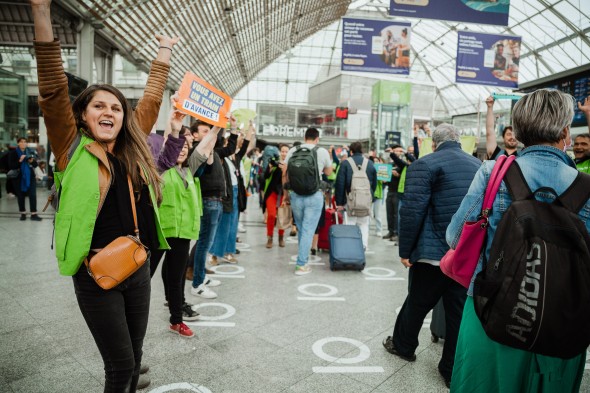NEWSLETTER
In Conversation: Holly Boyd-Boland, Virgin Atlantic


(Image via Greenpeace France)
The latest tactic by climate change activists doesn’t involve protesting at airports. Instead, they have been showing up at train stations to congratulate people for not flying.
Greenpeace turned up at Paris Gare de Lyon station to welcome TGV passengers coming from Milan, Mulhouse, Nice, and Marseille, with signs saying things like “Bravo! La Planète vous dit merci” (Bravo! The planet thanks you).
Meanwhile, in London’s St Pancras Station, climate group Flight Free UK said “thank you for not flying”, to Eurostar passengers going to Amsterdam, Brussels, and Paris.
It’s a smart way for these groups to push sustainable travel and the idea of lowering your carbon footprint. They are not saying don’t go on vacation – a negative message of denial that doesn’t resonate well with a lot of consumers.
Instead, their message is to go on vacation but take the train.
And train companies themselves are starting to latch onto the fact that sustainable travel is a marketing tool for them.
This comes as research shows growing awareness among consumers that flying drastically increases their carbon footprint. As a result, train companies are now selling tickets by directly promoting rail travel as better for the planet.
The most recent example is Trainline (which is a European rail booking service as opposed to a train operator).
Trainline has unveiled a website called “I came by train”, with the tagline, “save the planet, one journey at a time.”
The website includes a pledge for you to swap a flight for a train journey. If you fill it in (which as an aside, involves giving up your email address), Trainline plants a tree, via offsetting partner “onHand.”
On the form itself, you are invited to say why you took the train, options include “coastal cities are for people, not fish”, “melting ice is good for G&Ts and not ice caps” and “penguins shouldn’t be sunbathing.”
The whole campaign is even underpinned by a video and song by Craig David titled, “Better Days, I came by train”, showing that this is a heavyweight and high-budget piece of activity.
Airlines themselves are of course starting to integrate their networks with that of train companies.
For example, Star Alliance signed up Deutsche Bahn as the first rail member. And KLM/Air France works with the Thalys high-speed rail network.
In the light of the campaigns, we’ve been seeing, these collaborations make a lot of sense.
They tie into the current existing consumer sentiment and show that airlines want to offer lower carbon alternatives for the final part of the journey, where possible.
As a result, we expect (and encourage) a lot more of these airline/train links.
Of course, Europe has a fairly well-developed rail infrastructure, which does make train travel a viable alternative to short-haul flights.
That’s not so in many parts of the world, a point made by Air New Zealand CEO Greg Foran at last week’s APEX/IFSA EXPO.
In one of the thought leadership sessions, Greg Foran pointed out that New Zealand has neither an extensive highway nor rail network and so if you want to travel, flying is often the only realistic option.
Greg Foran’s vision for aviation decarbonization involves SAF for the long haul and then next-generation aircraft (electric, hybrid electric, and hydrogen-electric) for short haul.
Greg Foran admitted that they won’t replace 100-seat narrowbody aircraft, but when it comes to electric aircraft he proposed a different model. High-frequency flights, where you pay on board.
In Greg Foran’s words, we could be “thinking about it like an Uber. It’s basically just shuttling backward and forwards between Hamilton and Auckland and it’s maybe going every 30 minutes and you just turn up and pay for it when you get on the plane. Why not?”
Deal news
United Airlines & Jaguar Partner For All-Electric Tarmac Transfers (One Mile at a Time)
Icelandair Plans To Fly Domestic Carbon Free By 2030 (Simple Flying)
Designing sustainable passenger experience initiatives (APEX Media)
Connect Airlines CEO John Thomas on Connect’s pursuit of a “smarter way to fly” (APEX Media)
Airlines warned lack of common ESG metrics could limit access to capital (Flight Global)
Federal Road Map for Sustainable Aviation Needs Teeth (Bloomberg Law)
© 2022 SimpliFlying Pte. Ltd.